Thomas James Richards, Diaries, Transcript Vol. 3, 26 January to 8 November 1916 - Part 7
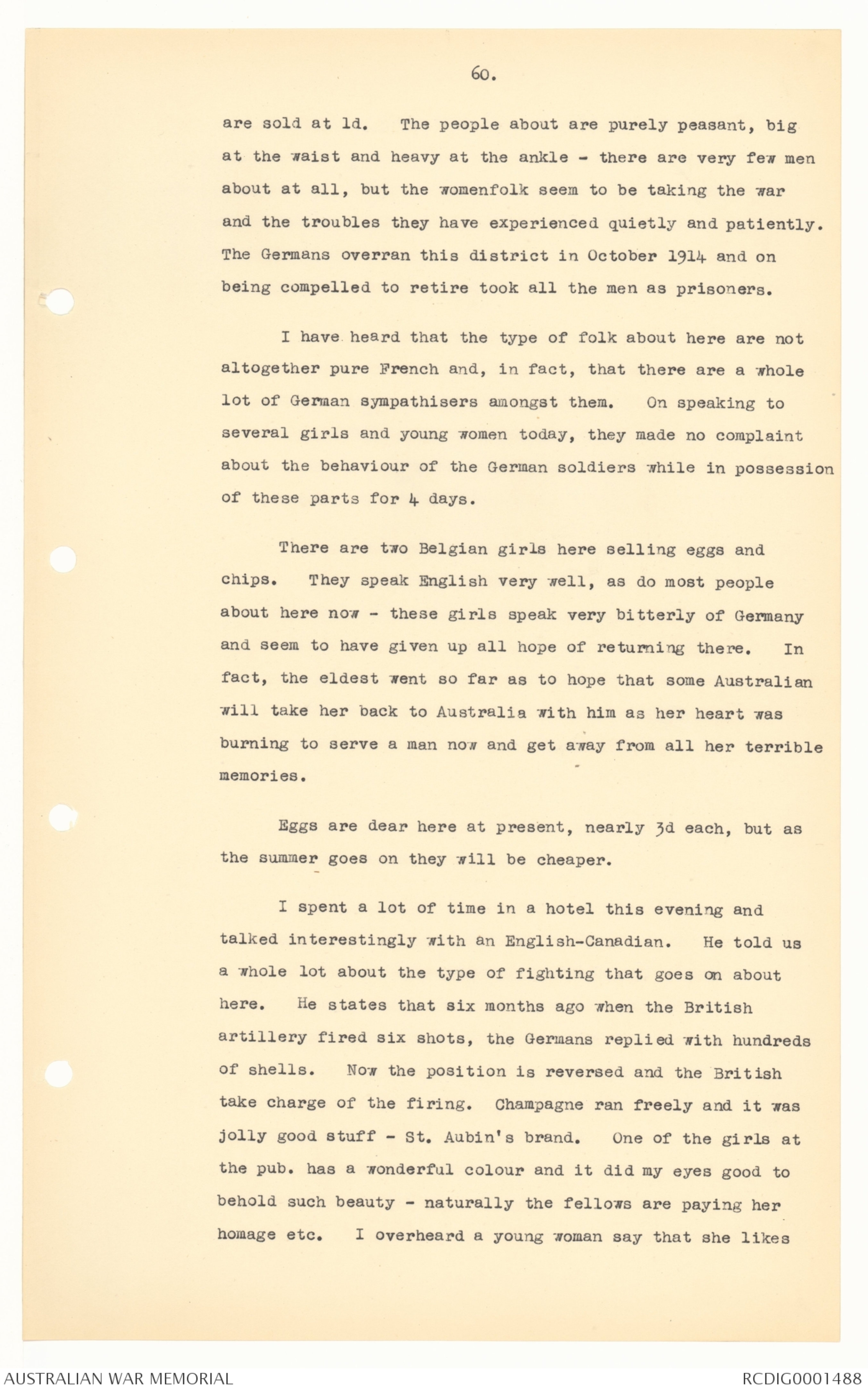
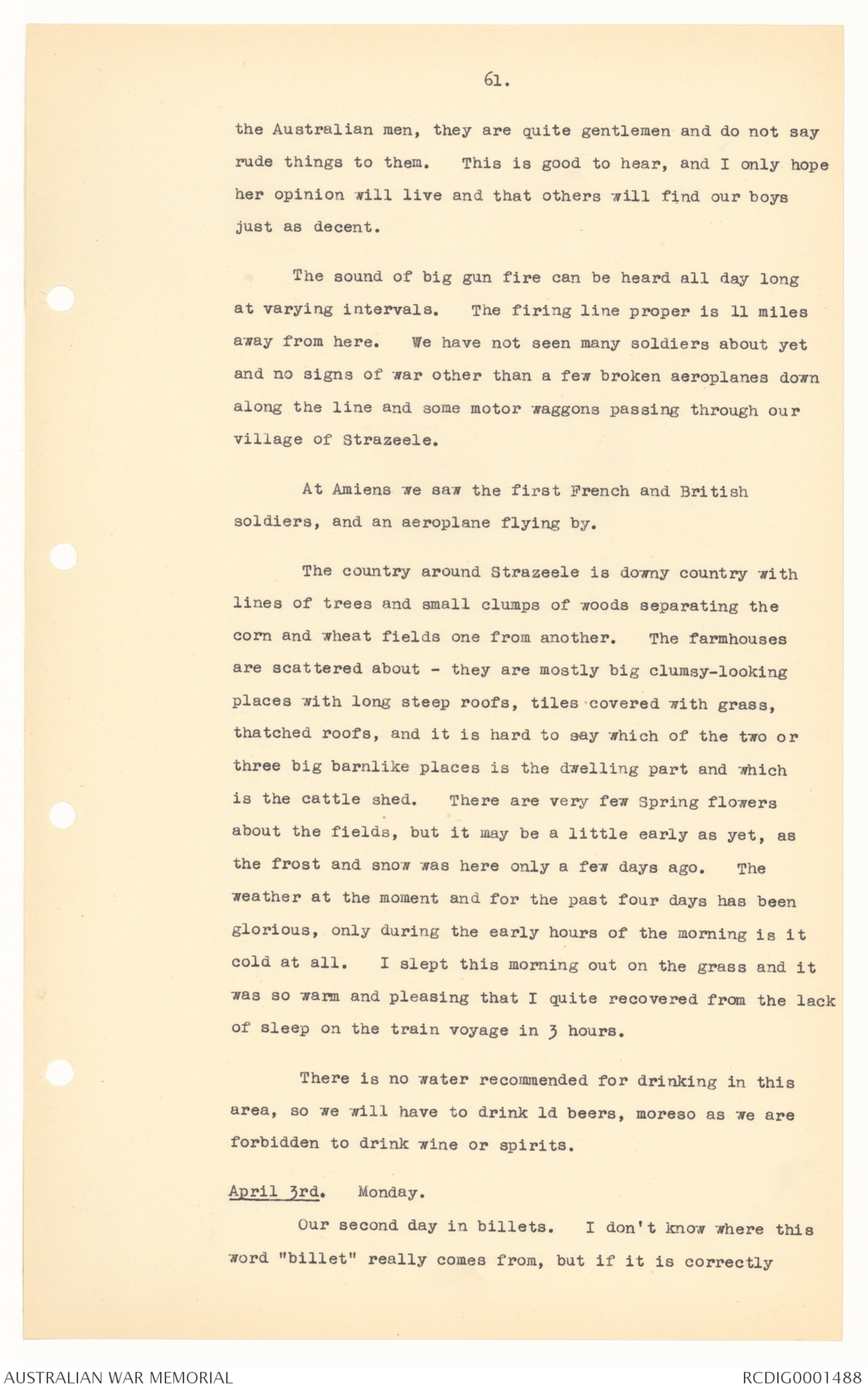
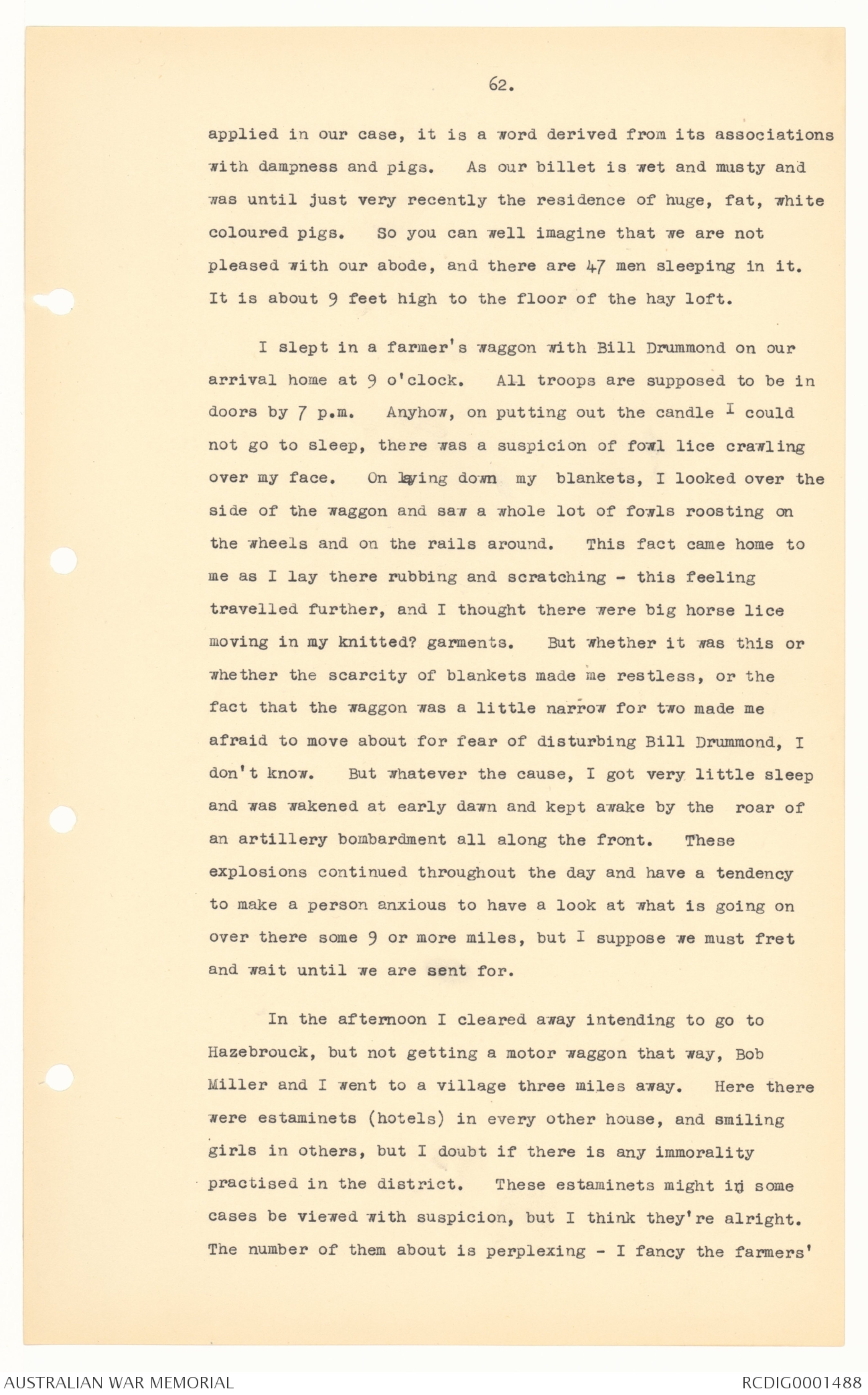
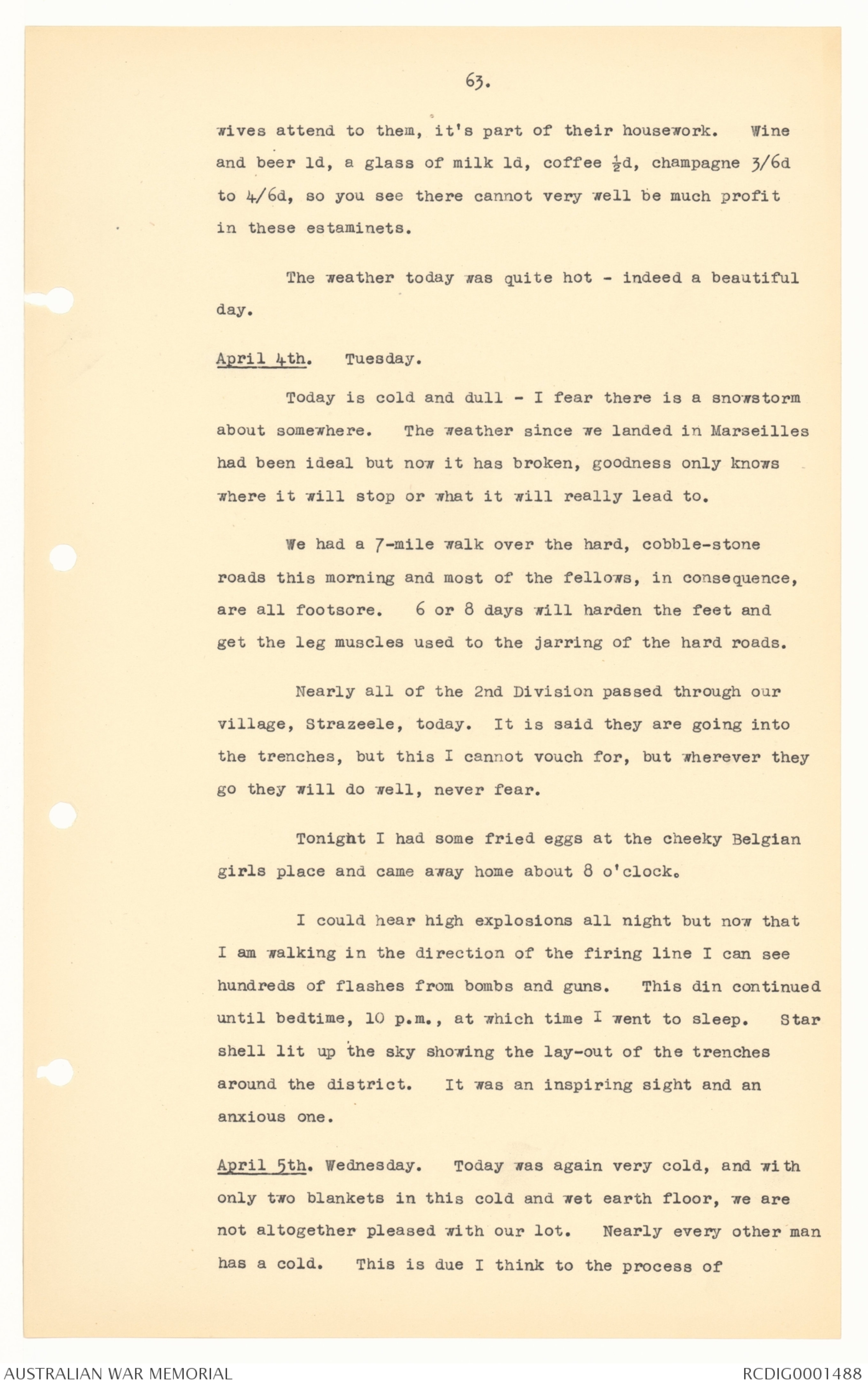
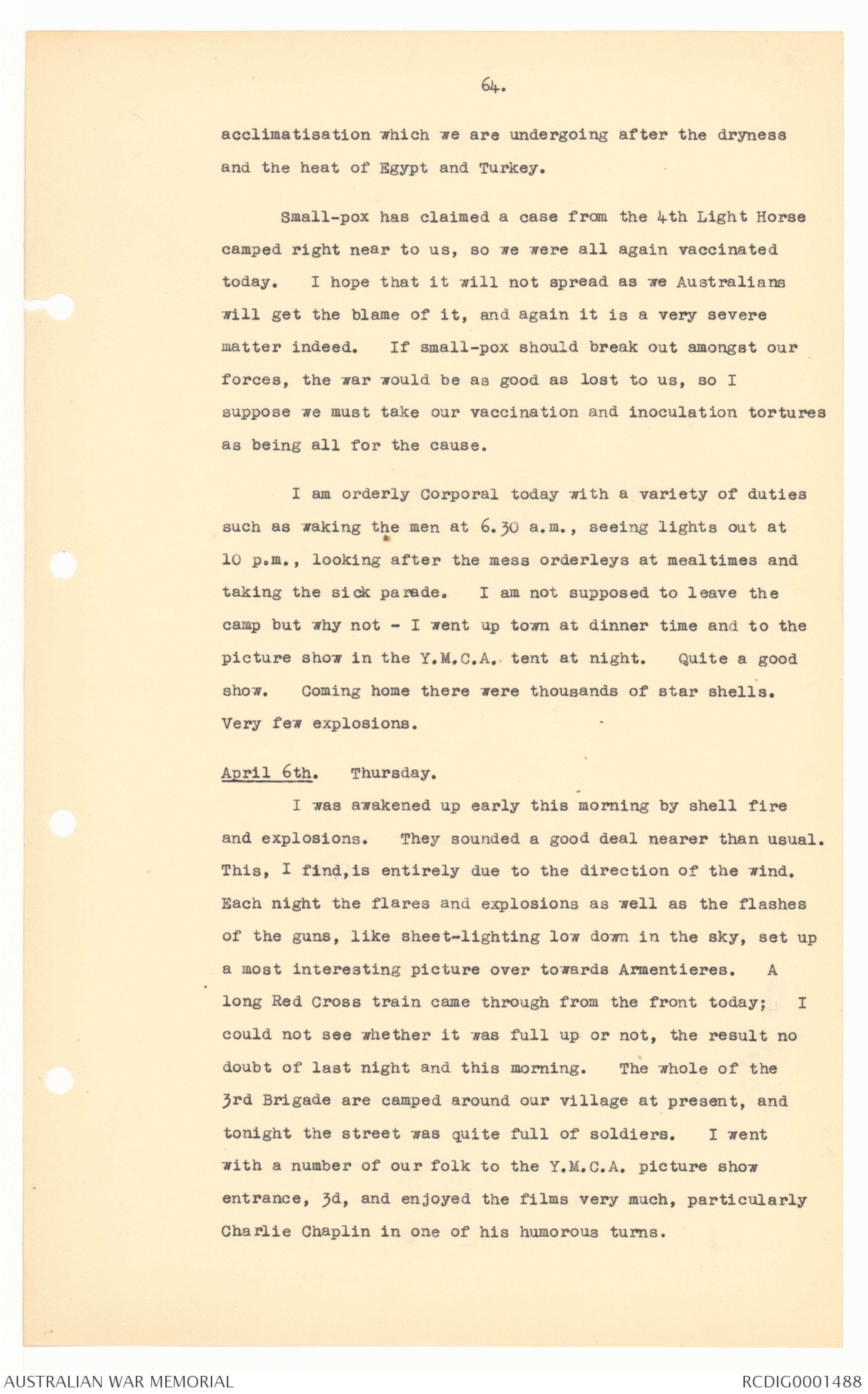
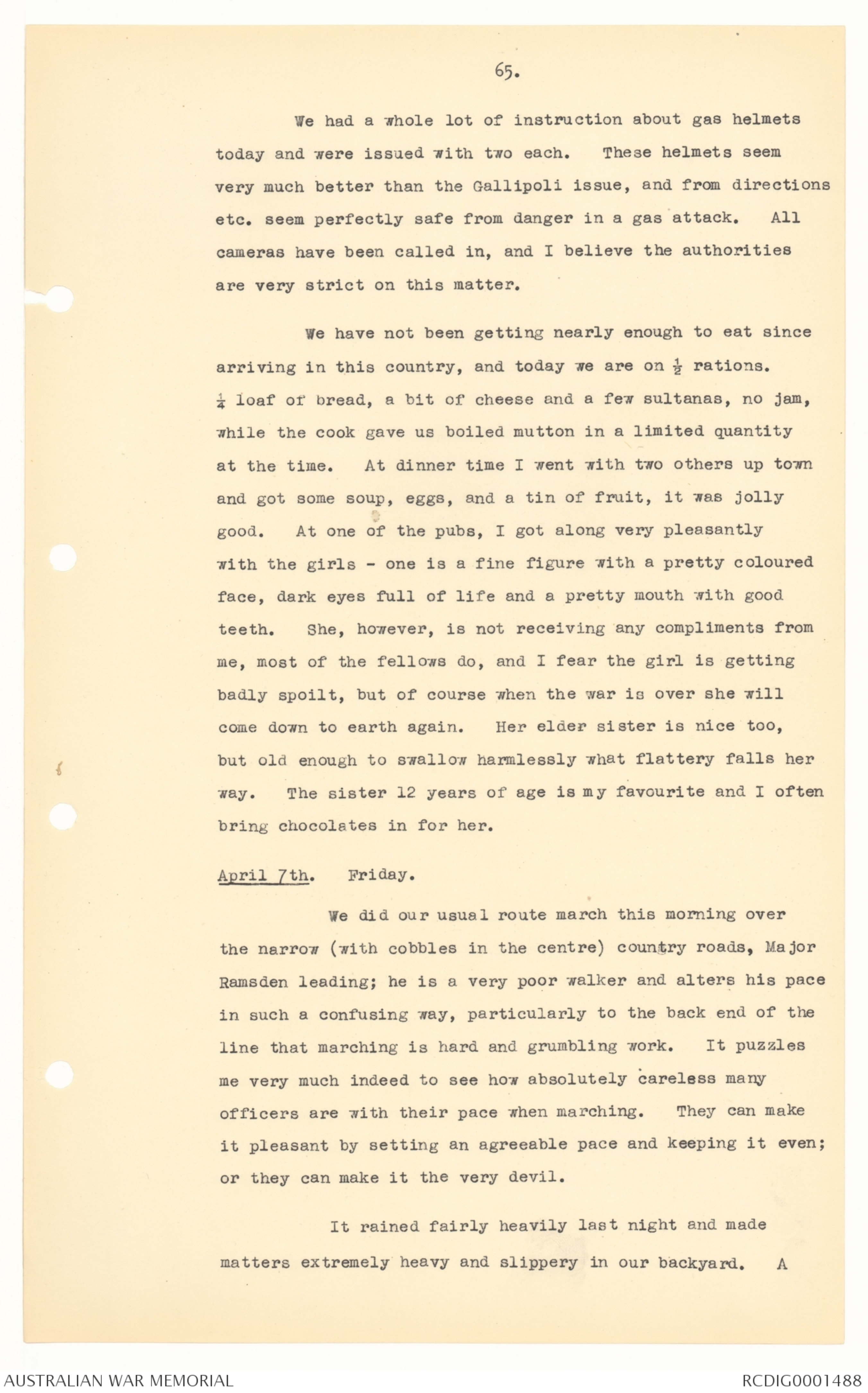
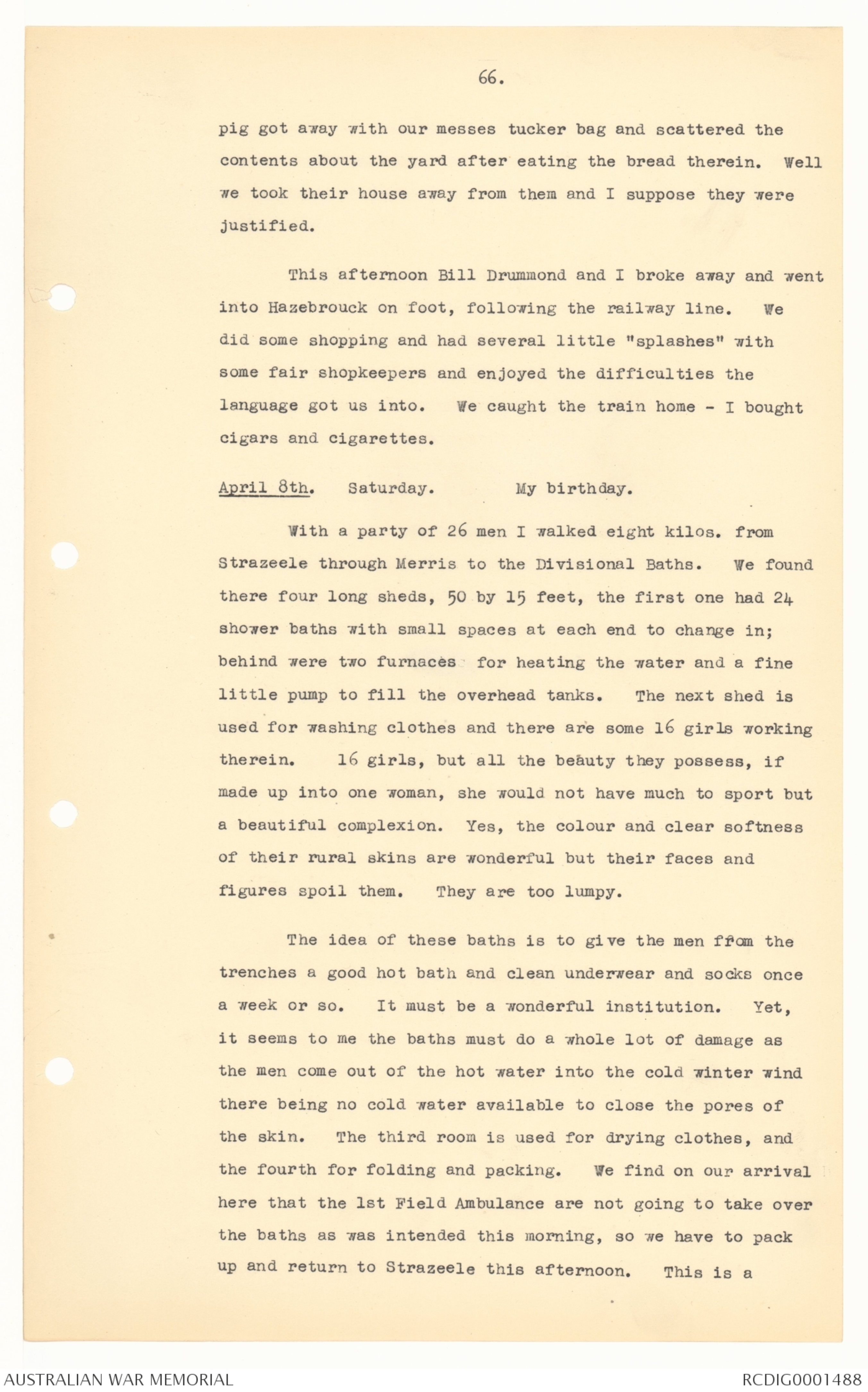
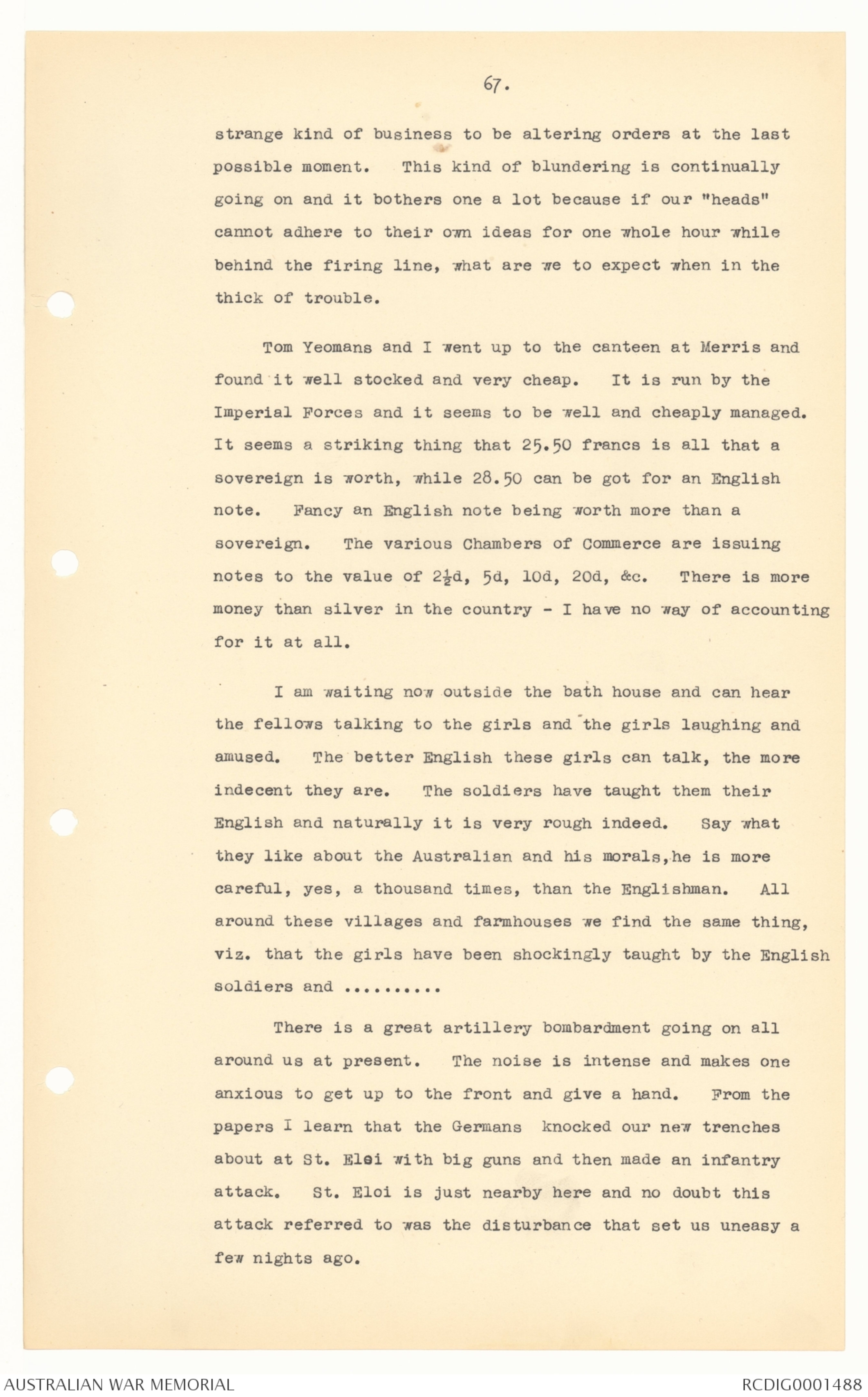
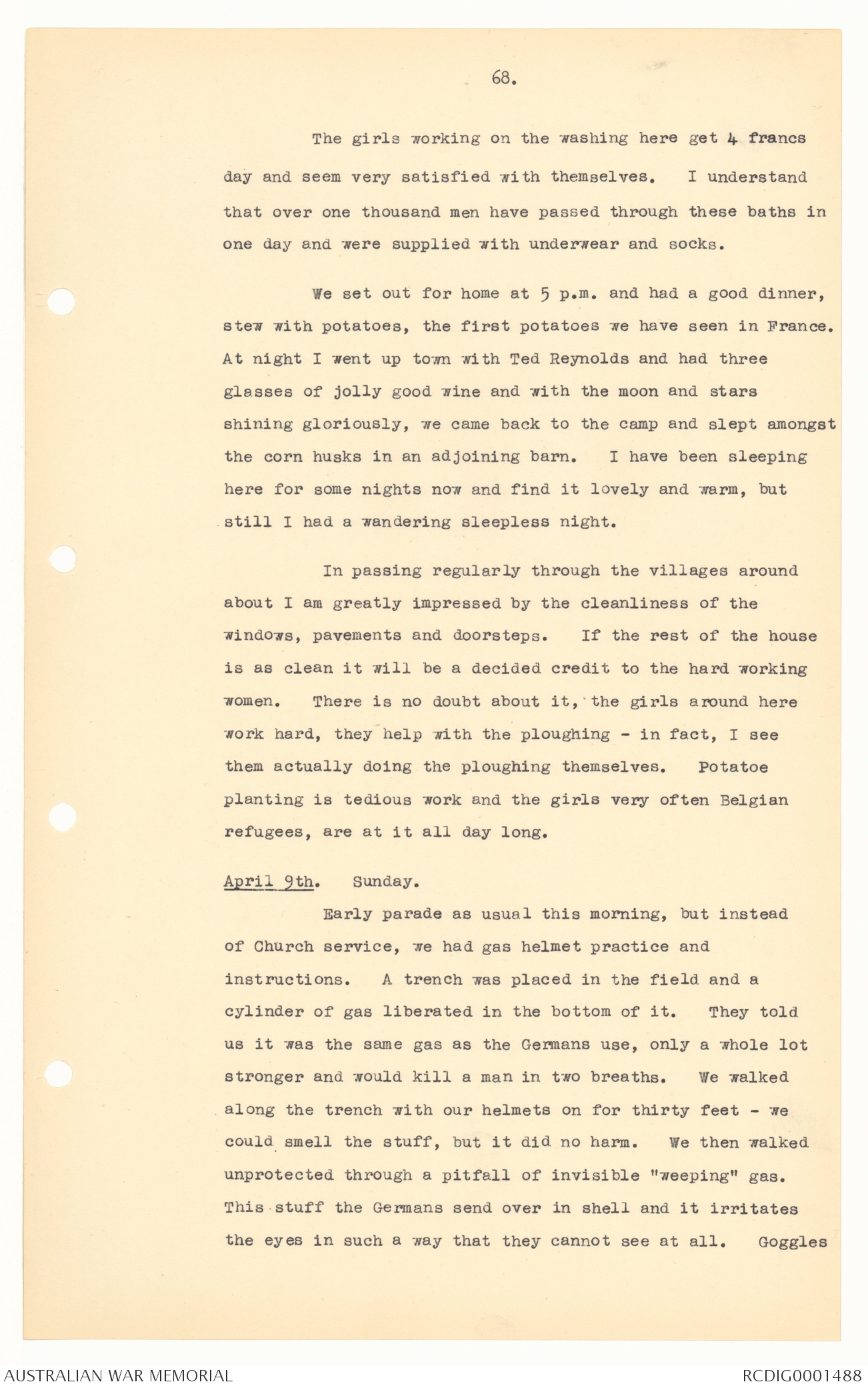
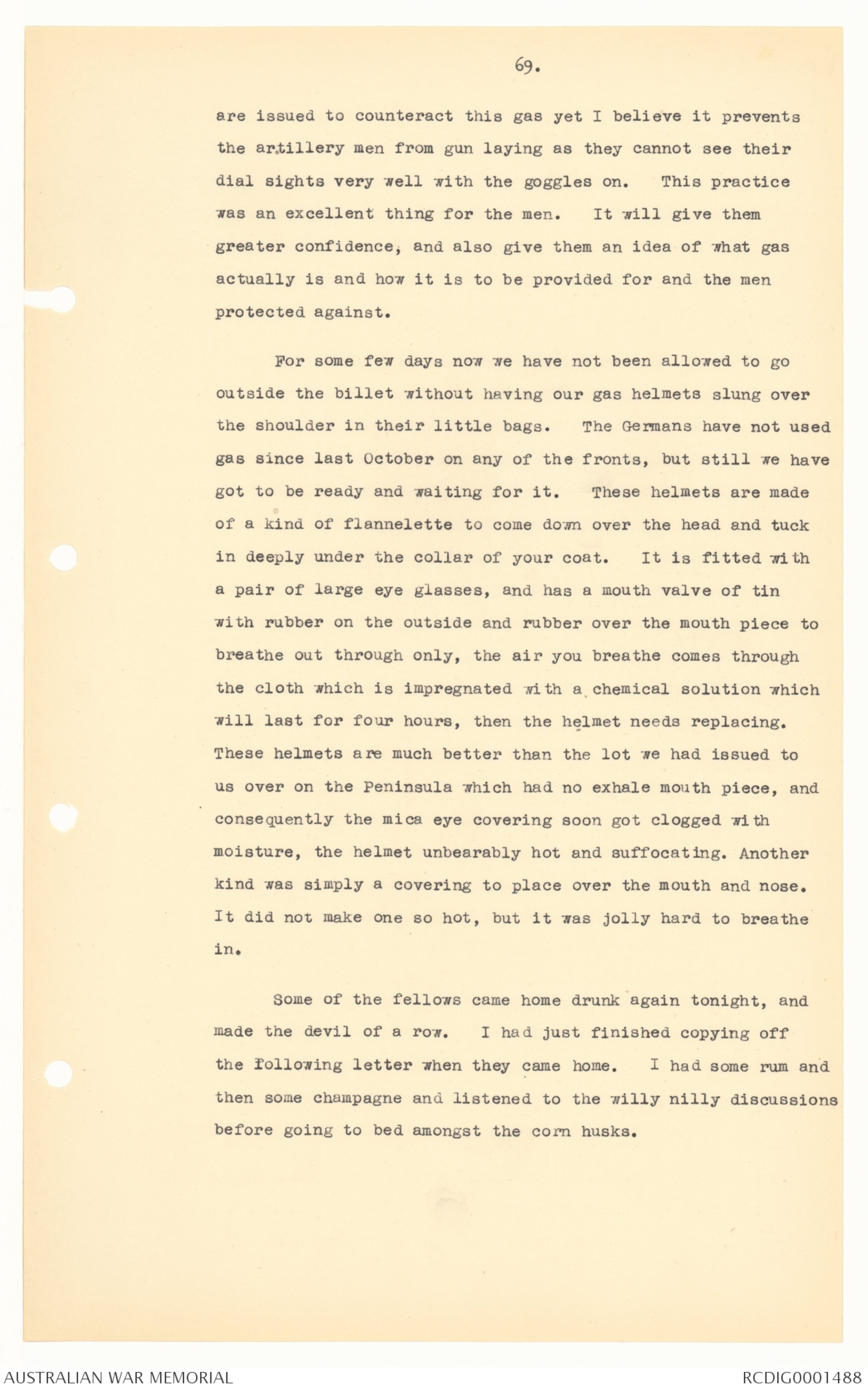
60.
are sold at 1d. The people about are purely peasant, big
at the waist and heavy at the ankle - there are very few men
about at all, but the womenfolk seem to be taking the war
and the troubles they have experienced quietly and patiently.
The Germans overran this district in October 1914 and on
being compelled to retire took all the men as prisoners.
I have heard that the type of folk about here are not
altogether pure French and, in fact, that there are a whole
lot of German sympathisers amongst them. On speaking to
several girls and young women today, they made no complaint
about the behaviour of the German soldiers while in possession
of these parts for 4 days.
There are two Belgian girls here selling eggs and
chips. They speak English very well, as do most people
about here now - these girls speak very bitterly of Germany
and seem to have given up all hope of returning there. In
fact, the eldest went so far as to hope that some Australian
will take her back to Australia with him as her heart was
burning to serve a man now and get away from all her terrible
memories.
Eggs are dear here at present, nearly 3d each, but as
the summer goes on they will be cheaper.
I spent a lot of time in a hotel this evening and
talked interestingly with an English-Canadian. He told us
a whole lot about the type of fighting that goes on about
here. He states that six months ago when the British
artillery fired six shots, the Germans replied with hundreds
of shells. Now the position is reversed and the British
take charge of the firing. Champagne ran freely and it was
jolly good stuff - St. Aubin's brand. One of the girls at
the pub. has a wonderful colour and it did my eyes good to
behold such beauty - naturally the fellows are paying her
homage etc. I overheard a young woman say that she likes
61.
the Australian men, they are quite gentlemen and do not say
rude things to them. This is good to hear, and I only hope
her opinion will live and that others will find our boys
just as decent.
The sound of big gun fire can be heard all day long
at varying intervals. The firing line proper is 11 miles
away from here. We have not seen many soldiers about yet
and no signs of war other than a few broken aeroplanes down
along the line and some motor waggons passing through our
village of Strazeele.
At Amiens we saw the first French and British
soldiers, and an aeroplane flying by.
The country around Strazeele is downy country with
lines of trees and small clumps of woods separating the
corn and wheat fields one from another. The farmhouses
are scattered about - they are mostly big clumsy-looking
places with long steep roofs, tiles covered with grass,
thatched roofs, and it is hard to say which of the two or
three big barnlike places is the dwelling part and which
is the cattle shed. There are very few Spring flowers
about the fields, but it may be a little early as yet, as
the frost and snow was here only a few days ago. The
weather at the moment and for the past four days has been
glorious, only during the early hours of the morning is it
cold at all. I slept this morning out on the grass and it
was so warm and pleasing that I quite recovered from the lack
of sleep on the train voyage in 3 hours.
There is no water recommended for drinking in this
area, so we will have to drink 1d beers, moreso as we are
forbidden to drink wine or spirits.
April 3rd. Monday.
Our second day in billets. I don't know where this
word "billet" really comes from, but if it is correctly
62.
applied in our case, it is a word derived from its associations
with dampness and pigs. As our billet is wet and musty and
was until just very recently the residence of huge, fat, white
coloured pigs. So you can well imagine that we are not
pleased with our abode, and there are 47 men sleeping in it.
It is about 9 feet high to the floor of the hay loft.
I slept in a farmer's waggon with Bill Drummond on our
arrival home at 9 o'clock. All troops are supposed to be in
doors by 7 p.m. Anyhow, on putting out the candle I could
not go to sleep, there was a suspicion of fowl lice crawling
over my face. On lying down my blankets, I looked over the
side of the waggon and saw a whole lot of fowls roosting on
the wheels and on the rails around. This fact came home to
me as I lay there rubbing and scratching - this feeling
travelled further, and I thought there were big horse lice
moving in my knitted? garments. But whether it was this or
whether the scarcity of blankets made me restless, or the
fact that the waggon was a little narrow for two made me
afraid to move about for fear of disturbing Bill Drummond, I
don't know. But whatever the cause, I got very little sleep
and was wakened at early dawn and kept awake by the roar of
an artillery bombardment all along the front. These
explosions continued throughout the day and have a tendency
to make a person anxious to have a look at what is going on
over there some 9 or more miles, but I suppose we must fret
and wait until we are sent for.
In the afternoon I cleared away intending to go to
Hazebrouck, but not getting a motor waggon that way, Bob
Miller and I went to a village three miles away. Here there
were estaminets (hotels) in every other house, and smiling
girls in others, but I doubt if there is any immorality
practised in the district. These estaminets might in some
cases be viewed with suspicion, but I think they're alright.
The number of them about is perplexing - I fancy the farmers'
63.
wives attend to them, it's part of their housework. Wine
and beer 1d, a glass of milk 1d, coffee ½d, champagne 3/6d
to 4/6d, so you see there cannot very well be much profit
in these estaminets.
The weather today was quite hot - indeed a beautiful
day.
April 4th. Tuesday.
Today is cold and dull - I fear there is a snowstorm
about somewhere. The weather since we landed in Marseilles
had been ideal but now it has broken, goodness only knows
where it will stop or what it will really lead to.
We had a 7-mile walk over the hard, cobble-stone
roads this morning and most of the fellows, in consequence,
are all footsore. 6 or 8 days will harden the feet and
get the leg muscles used to the jarring of the hard roads.
Nearly all of the 2nd Division passed through our
village, Strazeele, today. It is said they are going into
the trenches, but this I cannot vouch for, but wherever they
go they will do well, never fear.
Tonight I had some fried eggs at the cheeky Belgian
girls place and came away home about 8 o'clock.
I could hear high explosions all night but now that
I am walking in the direction of the firing line I can see
hundreds of flashes from bombs and guns. This din continued
until bedtime, 10 p.m., at which time I went to sleep. Star
shell lit up the sky showing the lay-out of the trenches
around the district. It was an inspiring sight and an
anxious one.
April 5th. Wednesday. Today was again very cold, and with
only two blankets in this cold and wet earth floor, we are
not altogether pleased with our lot. Nearly every other man
has a cold. This is due I think to the process of
64.
acclimatisation which we are undergoing after the dryness
and the heat of Egypt and Turkey.
Small-pox has claimed a case from the 4th Light Horse
camped right near to us, so we were all again vaccinated
today. I hope that it will not spread as we Australians
will get the blame of it, and again it is a very severe
matter indeed. If small-pox should break out amongst our
forces, the war would be as good as lost to us, so I
suppose we must take our vaccination and inoculation tortures
as being all for the cause.
I am orderly Corporal today with a variety of duties
such as waking the men at 6.30 a.m., seeing lights out at
10 p.m., looking after the mess orderleys at mealtimes and
taking the sick parade. I am not supposed to leave the
camp but why not - I went up town at dinner time and to the
picture show in the Y.M.C.A. tent at night. Quite a good
show. Coming home there were thousands of star shells.
Very few explosions.
April 6th. Thursday,
I was awakened up early this morning by shell fire
and explosions. They sounded a good deal nearer than usual.
This, I find, is entirely due to the direction of the wind.
Each night the flares and explosions as well as the flashes
of the guns, like sheet-lighting low down in the sky, set up
a most interesting picture over towards Armentieres. A
long Red Cross train came through from the front today; I
could not see whether it was full up or not, the result no
doubt of last night and this morning. The whole of the
3rd Brigade are camped around our village at present, and
tonight the street was quite full of soldiers. I went
with a number of our folk to the Y.M.C.A. picture show
entrance, 3d, and enjoyed the films very much, particularly
Charlie Chaplin in one of his humorous turns.
65.
We had a whole lot of instruction about gas helmets
today and were issued with two each. These helmets seem
very much better than the Gallipoli issue, and from directions
etc. seem perfectly safe from danger in a gas attack. All
cameras have been called in, and I believe the authorities
are very strict on this matter.
We have not been getting nearly enough to eat since
arriving in this country, and today we are on ½ rations.
¼ loaf of bread, a bit of cheese and a few sultanas, no jam,
while the cook gave us boiled mutton in a limited quantity
at the time. At dinner time I went with two others up town
and got some soup, eggs, and a tin of fruit, it was jolly
good. At one of the pubs, I got along very pleasantly
with the girls - one is a fine figure with a pretty coloured
face, dark eyes full of life and a pretty mouth with good
teeth. She, however, is not receiving any compliments from
me, most of the fellows do, and I fear the girl is getting
badly spoilt, but of course when the war is over she will
come down to earth again. Her elder sister is nice too,
but old enough to swallow harmlessly what flattery falls her
way. The sister 12 years of age is my favourite and I often
bring chocolates in for her.
April 7th. Friday.
We did our usual route march this morning over
the narrow (with cobbles in the centre) country roads, Major
Ramsden leading; he is a very poor walker and alters his pace
in such a confusing way, particularly to the back end of the
line that marching is hard and grumbling work. It puzzles
me very much indeed to see how absolutely careless many
officers are with their pace when marching. They can make
it pleasant by setting an agreeable pace and keeping it even;
or they can make it the very devil.
It rained fairly heavily last night and made
matters extremely heavy and slippery in our backyard. A
66.
pig got away with our messes tucker bag and scattered the
contents about the yard after eating the bread therein. Well
we took their house away from them and I suppose they were
justified.
This afternoon Bill Drummond and I broke away and went
into Hazebrouck on foot, following the railway line. We
did some shopping and had several little "splashes" with
some fair shopkeepers and enjoyed the difficulties the
language got us into. We caught the train home - I bought
cigars and cigarettes.
April 8th. Saturday. My birthday.
With a party of 26 men I walked eight kilos. from
Strazeele through Merris to the Divisional Baths. We found
there four long sheds, 50 by 15 feet, the first one had 24
shower baths with small spaces at each end to change in;
behind were two furnaces for heating the water and a fine
little pump to fill the overhead tanks. The next shed is
used for washing clothes and there are some 16 girls working
therein. 16 girls, but all the beauty they possess, if
made up into one woman, she would not have much to sport but
a beautiful complexion. Yes, the colour and clear softness
of their rural skins are wonderful but their faces and
figures spoil them. They are too lumpy.
The idea of these baths is to give the men from the
trenches a good hot bath and clean underwear and socks once
a week or so. It must be a wonderful institution. Yet,
it seems to me the baths must do a whole lot of damage as
the men come out of the hot water into the cold winter wind
there being no cold water available to close the pores of
the skin. The third room is used for drying clothes, and
the fourth for folding and packing. We find on our arrival
here that the 1st Field Ambulance are not going to take over
the baths as was intended this morning, so we have to pack
up and return to Strazeele this afternoon. This is a
67.
strange kind of business to be altering orders at the last
possible moment. This kind of blundering is continually
going on and it bothers one a lot because if our "heads"
cannot adhere to their own ideas for one whole hour while
behind the firing line, what are we to expect when in the
thick of trouble.
Tom Yeomans and I went up to the canteen at Merris and
found it well stocked and very cheap. It is run by the
Imperial Forces and it seems to be well and cheaply managed.
It seems a striking thing that 25.50 francs is all that a
sovereign is worth, while 28.50 can be got for an English
note. Fancy an English note being worth more than a
sovereign. The various Chambers of Commerce are issuing
notes to the value of 2½d, 5d, 10d, 20d, &c. There is more
money than silver in the country - I have no way of accounting
for it at all.
I am waiting now outside the bath house and can hear
the fellows talking to the girls and the girls laughing and
amused. The better English these girls can talk, the more
indecent they are. The soldiers have taught them their
English and naturally it is very rough indeed. Say what
they like about the Australian and his morals, he is more
careful, yes, a thousand times, than the Englishman. All
around these villages and farmhouses we find the same thing,
viz. that the girls have been shockingly taught by the English
soldiers and . . . . . .
There is a great artillery bombardment going on all
around us at present. The noise is intense and makes one
anxious to get up to the front and give a hand. From the
papers I learn that the Germans knocked our new trenches
about at St. Eloi with big guns and then made an infantry
attack. St. Eloi is just nearby here and no doubt this
attack referred to was the disturbance that set us uneasy a
few nights ago.
68.
The girls working on the washing here get 4 francs
day and seem very satisfied with themselves. I understand
that over one thousand men have passed through these baths in
one day and were supplied with underwear and socks.
We set out for home at 5 p.m. and had a good dinner,
stew with potatoes, the first potatoes we have seen in France.
At night I went up town with Ted Reynolds and had three
glasses of jolly good wine and with the moon and stars
shining gloriously, we came back to the camp and slept amongst
the corn husks in an adjoining barn. I have been sleeping
here for some nights now and find it lovely and warm, but
still I had a wandering sleepless night.
In passing regularly through the villages around
about I am greatly impressed by the cleanliness of the
windows, pavements and doorsteps. If the rest of the house
is as clean it will be a decided credit to the hard working
women. There is no doubt about it, the girls around here
work hard, they help with the ploughing - in fact, I see
them actually doing the ploughing themselves. Potatoe
planting is tedious work and the girls very often Belgian
refugees, are at it all day long.
April 9th. Sunday.
Early parade as usual this morning, but instead
of Church service, we had gas helmet practice and
instructions. A trench was placed in the field and a
cylinder of gas liberated in the bottom of it. They told
us it was the same gas as the Germans use, only a whole lot
stronger and would kill a man in two breaths. We walked
along the trench with our helmets on for thirty feet - we
could smell the stuff, but it did no harm. We then walked
unprotected through a pitfall of invisible "weeping" gas.
This stuff the Germans send over in shell and it irritates
the eyes in such a way that they cannot see at all. Goggles
69.
are issued to counteract this gas yet I believe it prevents
the artillery men from gun laying as they cannot see their
dial sights very well with the goggles on. This practice
was an excellent thing for the men. It will give them
greater confidence, and also give them an idea of what gas
actually is and how it is to be provided for and the men
protected against.
For some few days now we have not been allowed to go
outside the billet without having our gas helmets slung over
the shoulder in their little bags. The Germans have not used
gas since last October on any of the fronts, but still we have
got to be ready and waiting for it. These helmets are made
of a kind of flannelette to come down over the head and tuck
in deeply under the collar of your coat. It is fitted with
a pair of large eye glasses, and has a mouth valve of tin
with rubber on the outside and rubber over the mouth piece to
breathe out through only, the air you breathe comes through
the cloth which is impregnated with a chemical solution which
will last for four hours, then the helmet needs replacing.
These helmets are much better than the lot we had issued to
us over on the Peninsula which had no exhale mouth piece, and
consequently the mica eye covering soon got clogged with
moisture, the helmet unbearably hot and suffocating. Another
kind was simply a covering to place over the mouth and nose.
It did not make one so hot, but it was jolly hard to breathe
in.
Some of the fellows came home drunk again tonight, and
made the devil of a row. I had just finished copying off
the following letter when they came home. I had some rum and
then some champagne and listened to the willy nilly discussions
before going to bed amongst the corn husks.
 Sandy Mudie
Sandy MudieThis transcription item is now locked to you for editing. To release the lock either Save your changes or Cancel.
This lock will be automatically released after 60 minutes of inactivity.